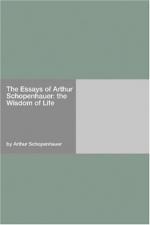|
This section contains 9,178 words (approx. 31 pages at 300 words per page) |

|
SOURCE: "Schopenhauer," in The Spirit of Modern Philosophy, Houghton Mifflin Company, 1920, pp. 228-64.
Royce was an American philosopher whose works include The World and the Individual (1900) and Lectures on Modern Idealism (1919). Royce's neo-Hegelian idealism conceives of reality as fragmentary manifestations of an absolute mind; only when the individual understands the unity of the ideal absolute can perfection be attained. In the following excerpt from a lecture originally published in 1892, Royce contextualizes Schopenhauer's metaphysics with regard to idealism versus realism and evaluates Schopenhauer in relation to Hegel.
While there are a few philosophers whose name is more widely known than that of Schopenhauer, the study of his writings, at least in this country, has fallen largely into neglect. A not unfounded distrust of his metaphysics has led to the false assumption that there is nothing of philosophical importance to be learned from him. [However,] even Schopenhauer's extravagances very often...
|
This section contains 9,178 words (approx. 31 pages at 300 words per page) |

|


